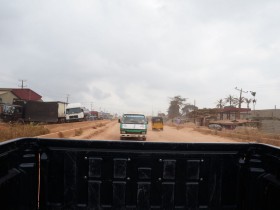Talking with a lot of executives at multinational companies interested in expanding their business presence in Nigeria, I learned that one of the main issues they have is finding a good and credible distributor or agent to help them reach their business goals in Nigeria. International companies in Nigeria like using local third-party logistics services and partners (3PLs) as a way to enter the Nigerian market while mitigating their risk and exposure.
Based on the numerous requests to find a distributor, I decided to write about some of the major challenges of distribution in Nigeria. Although these challenges vary from sector to sector – distribution of Fast-Moving Consumer Goods (FMCG) products differ from the distribution of medical devices – the challenges listed below are the main challenges that cut across most sectors especially as it pertains to Business-To-Business (B2B) distribution in Nigeria.
Here are the top 5 challenges:
Beauracracy and Red Tape: Although Nigeria has access to a coastal line that should make international trading easy, getting your product into Nigeria can be very challenging. Customs and port authorities can make it very difficult for businesses to get their goods cleared at the port. The Lagos port complex in Apapa, Lagos is the biggest port in the country and that is where most imports come through. Deciphering the regulatory environment can take time and bureaucratic red tape can leave executives frustrated even before their products leave the port and hit the roads.
Bad Roads & High transportation cost: It is not an understatement to say that the roads in Nigeria are not in very good shape for efficient distribution. Nigeria is no different from other frontier markets that struggle with inadequate infrastructure. Bad roads significantly increase transportation cost for distributors. This cost of transportation is further increased because of a fragmented market that is not always connected to the major road networks. So depending on your product and where your customer is, the distribution challenges are heightened when the consumer is not in a major city and is not connected to the major road networks. Learn more about the distribution and transportation network in Nigeria.

Warehousing & Inventory Management: After overcoming the challenge of getting your product into the country and the difficulty of navigating the bad roads, the next challenge is storage and inventory management. Some distributors do not have the appropriate warehouse infrastructure for the products that they distribute. For instance, perishable goods that have to be stored in cold rooms will suffer from the inconsistent power supply that affects every Nigerian business. Because of high storage cost, some distributors outsource their warehousing, exposing their international partners to additional risk. There is also a lack of visibility into the market because distributors lack the required information technology infrastructure, making it difficult for management to keep proper track of stock levels and to share that information with partners in the market.
Demand Planning, Sales & Marketing: Closely linked to the lack of information is the challenge that distributors have with forecasting demand and meeting their sales goals. Along with fluctuating costs and a devalued currency (Naira), distributors in Nigeria struggle to get their hands on foreign exchange. This makes it difficult for some distributors to bring in goods at a consistent and steady rate to meet the demand for the product. This is also compounded by the lack of market information and an inconsistent marketing strategy that does not allow the product to secure a dominant and secure position in the market. This is particularly frustrating for both the distributors and their international partner. The international company is unhappy about inadequate sales. The distributor, on the other hand, is frustrated with the lack of marketing and sales support from the international company. The less information shared between all stakeholders involved, the less successful the distribution strategy is.
Finding the right people to work with: Last but not least is finding quality staff. As international companies find it difficult to find the right distributors, so do distribution companies in Nigeria find it difficult to find the right staff – well-trained drivers, marketers, sales people – to run their operations efficiently. The problem of finding high-quality skilled labor is an issue that plagues most businesses in Nigeria – not only distributors. A survey of over 100 small business owners revealed that the number one issue that Nigerian business owners have with their business is finding quality and highly trained staff. As companies look for distributors in Nigeria, they have to take the skill-gap into consideration. Businesses have to consider training as a potential cost when choosing a distributor in Nigeria.
While these challenges may seem overwhelming, a good amount of multinationals have made significant headway into the Nigerian market. To thrive in the market, you have to be patient to properly understand the market and be willing to invest in finding the right distribution partner, training the right people and providing the appropriate marketing and sales support to your local partner. These have to be incorporated in your distribution strategy if you plan for long-term success in the Nigeria Market.


